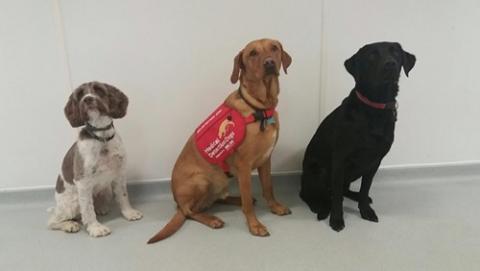Sniffing out Pseudomonas: medical detection dogs and cystic fibrosis
People living with cystic fibrosis (CF) are particularly susceptible to Pseudomonas infection, and if it is not detected and treated early it can be hard to clear and can cause significant lung damage. The presence of a Pseudomonas lung infection can be difficult to detect, particularly in children, and people with CF may have the infection for some time before it is confirmed that it is due to Pseudomonas. If Pseudomonas is treated early, with effective antibiotics, it can lead to better long-term lung health.
One reason that detection is difficult, is due to timing; it is only at regular, two-to-three-month clinic appointments that Pseudomonas is tested for. The other reason is that the presence of Pseudomonas in the lungs is difficult to confirm. Typically, Pseudomonas is tested for in sputum, which adults with healthier lungs and children don’t produce. For these people, one way of detecting Pseudomonas is to ask them to cough onto a swab, or to take a swab of the back of the throat. However, these methods don’t always pick up the presence of the bacteria. Other ways of detecting Pseudomonas, are invasive, uncomfortable, expensive and cannot be used on a regular basis. Better ways of detecting Pseudomonas are urgently needed.
Smelly bugs!
You probably know that Pseudomonas is a dangerous infection, but did you also know that it has a very distinct smell? Professor Jane Davies, who is Professor of Paediatric Respirology and Experimental Medicine at the National Heart and Lung Institute, Honorary Consultant in Paediatric Respiratory Medicine at the Royal Brompton & Harefield NHS Foundation Trust, and leads the Cystic Fibrosis Trust’s ‘personalised approach to Pseudomonas aeruginosa’ Strategic Research Centre, has a long-standing research interest in the better detection and treatment of Pseudomonas. She wondered whether medical detection dogs could be used to identify Pseudomonas based on its smell, a question that led to a collaboration with the charity Medical Detection Dogs.
Published in the European Respiratory Journal today, researchers have shown that the charity’s highly trained Bio Detection Dogs could distinguish the presence of Pseudomonas infection from other infections that people with CF may develop. This shows that the use of medical detection dogs to detect Pseudomonas in samples from people with CF is possible in theory.
Sitting for Pseudomonas

Once they were fully trained by Medical Detection Dogs trainers, the dogs sniffing skills were put to the test. The dogs (Lizzie, Flint and Oakley pictured above, courtesy of Medical Detection Dogs) were bought into a special testing room, where Pseudomonas samples were set up on testing stands, at dog-head height. The stands contained a small amount of the liquid used to grow bacteria in the lab, and either included Pseudomonas, another CF bacteria or no bacteria at all. The dogs walked around the room sniffing each sample in turn. Once the dogs had detected the Pseudomonas in the sample, they either sat down next to that sample or stopped walking at that sample.
The dogs were trained to tell the difference between Pseudomonas and other bacteria they have previously been trained to detect, and to distinguish between Pseudomonas and other bacterial infections people with CF may have at the same time. The dogs were also tested to see whether they could detect the presence of Pseudomonas at different concentrations.
Next steps
The samples used so far were grown in the lab, so the next step will be to discover whether the dogs can identify Pseudomonas from samples from people with CF, such as cough swabs. The Trust is funding this crucial next step as part of Professor Davies’ Strategic Research Centre.
Professor Davies said: “This is a really exciting development. Advanced technology to detect infections, for example in breath, has proved difficult so far. The successful training of the dogs on cultured samples will now be used as the foundation for testing patient samples directly.
“People with CF could ultimately monitor their lung infections from home by sending in samples for the dogs to check. We are very grateful to those with CF, cared for by the Royal Brompton Hospital, for providing samples for this project, and to the CF Trust for their funding support of the next stage of this project as part of the Strategic Research Centre for Pseudomonas infection.”
You can read more about this story by reading the press release on the Medical Detection Dogs website or by reading the research paper here.
